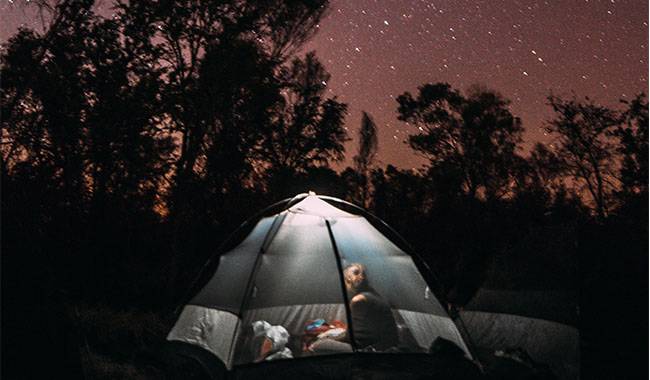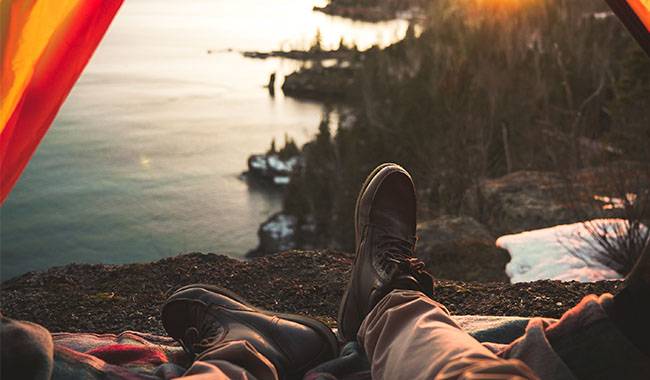
Hiking alone has its own charm. No one stops you from thinking, you can sing in a thick voice by the fire and go at any speed. But there is often a problem among beginning hikers – how to fall asleep alone in a tent in a dense forest or a desolate ravine? Here we have compiled some tips based on our own experience in dealing with this fear. So we’re not going to focus on how to pitch a tent and build a fire. Instead, we’ll show you how you can gradually learn to fall asleep calmly on your own while camping. You will learn more about How to Spend The Night Alone in The Wild by LCN Outdoors article.
What Might Scare You?
Forests, mountains, meadows, rivers, or lakeshores – a strange and unfamiliar environment for city dwellers. There are no people, no supermarkets in the suburbs, nothing familiar at all. That’s why the inexperienced person is frightened in such places, causing him to awaken those instincts that lie dormant in the city. This is both a good thing and a bad thing at the same time. It is good because the instincts help to survive, but it is bad because they can also cause psychological discomfort. To keep your primal instincts from kicking in and clouding your mind, prepare in advance for what you will encounter when you are alone in the wild.
This is what becomes fearful when spending the night alone.
- Sounds. The rustle of grass and leaves, the sound of a branch breaking, a sudden gust of wind, birds taking off, small animals, pebbles crumbling off rocks. All of these things make sounds, often very suddenly.
- Strange shadows. In the dark, the shadow of a bent tree, stump, or bush makes the imagination run wild.
- Wild animals. Or rather, stories about them. Many people are afraid to walk alone because they have heard from locals about bears, wolves, and aggressive wild boars. You should double check this information and remember that wild animal are afraid of people and not to approach them, especially if you are camping overnight near populated areas.
- Visibility is limited. Especially if you are spending the night in a forest or clearing in the woods, there are bushes and trees everywhere. This is scary because you can’t see anything and don’t know who might be lurking around. Even the rustling of a small mouse or hedgehog can be frightening.
- The play of our minds. In trying to find explanations for certain phenomena, the mind is able to mystify many things. Therefore, people are afraid of all kinds of evil spirits: wood spirits, mauka, mermaids, wood spirits, and anything that cannot be explained.
- Unpreparedness. Mistakes caused by poor travel planning. For example, if you incorrectly calculate how much distance you can travel in a day. It’s almost dark and you’re still on the road and haven’t found a suitable tent site. Or you pitch your tent in the dark under a creaking fir tree, making it impossible to sleep.
On a deserted beach or in a forest – it’s scary everywhere, just for different reasons of fear.
What Is Really Dangerous
Usually, spending the night alone is peaceful, but the most terrible things happen in the mind of a solo hiker. He winds himself up, listens too much to what is happening around him, and is afraid of what in principle can not happen. And this is where the real danger lies.
- The cold. If you have a summer sleeping bag, and at night you encounter frost, you will be very cold, fidgeting in the sleeping bag, trying to stay warm, you will certainly not get a good night’s sleep. To reduce the cold, you should eat a good meal and drink hot tea before going to bed.
- unfriendly people. Because tourists like you won’t touch you, the locals are drunk or just unfriendly. Bring pepper spray to protect yourself and don’t camp close to the road. You can also blend in to the area by wearing a dark green tent.
- Insects and snakes. Insects will fly around and attack the lantern lights and snakes will crawl into the tent. Light a fire and spray your tent and clothes with special products to ward off mosquitoes and mosquito nets. Before you go to bed, check your tent to make sure no one else is living inside.
How To Prepare For A Solo Overnight Stay

You can get rid of fear and unnecessary risk by preparing for your trip in advance. You should start planning your trip at home so that you know what to expect from your trip.
Learn the theory
Getting the right mental attitude is half the battle. Before you go on an overnight camping trip, watch a related learning video. there are many videos on YouTube of solo trips. You will see firsthand how such a trip is conducted, what the participant’s experience is, what he goes through, how he prepares, what he is afraid of, and how he overcomes his fears. By watching such a video, you can experience what the protagonist went through and reduce fear in practice. It also helps inspire more self-confidence to go camping. For example, this video is from a girl who was hiking alone in a wilderness area for the first time and filmed everything live.
To make it easier to fall asleep, download a movie or TV show on your phone and watch it before you go to sleep in your tent. This will help you create a familiar environment, be less distracted by extraneous sounds, and feel comfortable.
Tip: Don’t watch anything scary before you go camping. I watched “The Dyatlov Affair” before my first hike and every clearing seemed like the “wrong energy” place to me, and all the sounds around me were even more frightening.
Start hiking in summer
In summer, it is warmer and therefore more comfortable. Also, in the summer, the nights are shorter and it dawns earlier. In the winter and off-season, inexperienced hikers may not have time to choose a parking spot and suddenly find themselves in the dark with limited visibility. In summer, there is plenty of time to choose a spot and you don’t have to dread the darkness around you for long: it’s already dawn at 5 a.m., the birds are singing and the anxiety recedes.
Make an easy and short route
If this is your first time camping alone overnight, don’t go so far as to wear yourself out on a long journey. This should be an easy route through a place you know well, or at least fairly well. This will give you self-confidence and reduce the likelihood that you will make mistakes in terms of where to camp. If the area is unfamiliar, study a map and find out where there is clean water. Ask locals or experienced hikers what animals are in the area and if there are any to be afraid of.
Hiking solo on popular roads
You don’t need to go through wilderness and areas without tourists. For the first time, try one of the popular hiking trails. These trails are predictable: there are maps, water sources are well known, and there are established camping sites along the way. Most importantly, you won’t find yourself alone at night. At this time of year, every such campsite is packed with tents. So you’re sleeping alone, but there are still plenty of tourists around. It is safe and psychologically comfortable. This method will help you adapt faster and after a while, you will feel psychologically comfortable and fall asleep alone.
Spend the night near the town
If you have no experience camping alone, or if this is your first overnight trip, plan your escape route. What if something goes wrong? For example, it may rain heavily and your tent will get wet, or it may be too scary. So set up camp close to a populated area so you have somewhere to go back to. But don’t camp too close to a village either, because dogs and other noises can cause you to lose sleep. Your tent may also be spotted by less friendly locals, such as kebab companies. In this case, it is best to have a protective swamp-colored tent that is not visible from 328 feet (100 meters) away.
Spend the night alone in the mountains. Below is a village. Psychologically, the proximity of human settlements provides reassurance. The only bad thing is the village dogs, which may bark until dawn or come to visit you.
Choose a suitable parking space
It is most comfortable to stand in an open clearing. Have a good view, which means you will be able to see what is happening around you. Try to pitch your tent on a small hill so that it won’t be flooded in case of rain. Avoid camping under freestanding trees as they can be struck by lightning during thunderstorms. The same applies to trees with dry branches that may fall on the tent in case of strong winds.
If there is water near the camp and plenty of dry firewood nearby, that’s great. If you plan to keep the fire going until morning, it is worthwhile to prepare enough firewood in advance to last throughout the evening and night. If you don’t collect enough firewood, you will have to search for it in the dark with a flashlight – not pleasant or disturbing.
Setting up camp at dawn
Don’t wait until dusk to start setting up your tent, when it is still light and sunny. By sunset, you will have set up camp, found firewood, fetched water, cooked dinner, and be fully armed for the darkness. In the process, you’ll likely forget the discomfort and get used to the place.
If you delay until the last minute and pitch your tent at dusk, you run the risk of being under a lot of stress: taking a long time to do anything, wandering around in the dark looking for dry firewood and shuddering at any sound you hear. It’s also hard to find a good parking spot in the dark.
Inhabiting the territory
When you have chosen a place to park, explore it and feel like it is yours. Look around and see where everything is. Remember where the creaking trees are, where the stump is, and how it might look like some kind of monster in the dark. When it’s dark, you’ll know where everything is and what it really looks like.
It is important not to just look around, but to mentally inhabit the place. You and everyone around you should have a sense of who takes over the area at night and who owns the place.
Tip: Prepare firewood, cook, make sleeping arrangements – all of these distractions help you settle in and feel “at home” in your chosen territory.
Don’t leave any leftovers around your campfire or tent
Animals are attracted to the smell of food emanating from the campsite. While these animals may not show themselves during the day, at night everything around you may start moving and rustling. Voles, toads, raccoons, and even curious foxes may come looking for you. If you’re standing near a populated area, a dog or cat may pass by. To avoid getting spooked or hearing suspicious noises, try not to leave anything near the fire. Remove canned goods, sausage wrappers, and anything that might give off an odor that attracts animals. It’s one thing if a dog stops, but it’s another if it’s a larger animal.

Preparing for an animal encounter
Wild animals can be found almost everywhere, but as a rule, they try to stay away from humans. There are exceptions, if they smell food, or if their curiosity is satisfied. That’s why it’s a good idea to have some special means on hand: pepper spray or stray dog repellent, firecrackers, fake flares, or at least a loud whistle. To avoid such encounters, spend the night near populated areas where large animals will not approach.
Provide light for yourself
In order to make you feel comfortable in the dark, pay attention to the light source.
- Torch. It is best if you have a headlamp: you can use it to get firewood and read in the tent. But you can also get a regular handheld one.
- A campfire. You can keep it going until bedtime or until morning. If you want the fire to burn all night, prepare large wood that needs to burn for a long time.
- USB lights or garlands for the tent. You can hang them on a nearby tree or directly on the tent. This way, everyone can see you from anywhere, but it’s not scary at all. This will make you feel like you are at a festival.
To make going to sleep more comfortable, enter the tent before the fire goes out. You can hang lanterns in the tent, read books and watch burning branches.
Do not listen to the sounds of nature and exclude total silence
There is no need to “fall in line” and let your imagination run free. There are so many sounds around you that if you listen carefully, you risk getting a serious fright. Imagine a large nocturnal bird flying amidst the roar of cicadas? That could give you a heart attack.
Better yet, don’t sit and sleep in complete silence. That’s the scariest way to go: every sound seems so loud that even the flow of your own blood in your ears can prevent you from falling asleep. You can pitch your tent by a stream or waterfall with the sound of water. Or you can download a movie or audiobook to your phone and listen to it before you go to sleep.
Tip: On my first night in the forest, I actively listened to everything that was happening around me and jumped at every rustle I heard. Then I picked up a ukulele, a small but lively guitar, and began to play and sing out loud. After a while, the fear completely receded. Another time, I slept in a forest where the internet was fast. I turned on a video I’d been wanting to watch for a long time and cranked up the sound. It wasn’t scary at all, and it was almost homely.
Imagine that you are not a victim, but a predator
When it’s dark, stay away from your tent and campfire so you can see your camp from the outside. You can even lurk in the bushes or behind trees and watch what is happening around you. Pretend that it is not you who is being watched, but that you are hunting and studying the enemy. When you get bored, you can go out and go to your tent or fire, but understand that you are not a victim, instead, you are a predator and a hunter. This technique will help you to be less afraid of everything around you in the dark and to feel more confident.
To make sure you don’t forget anything and miss any important details while setting up camp, we have a quick tip sheet.
To be less scared, prepare for traveling alone in advance. It’s best to start planning your trip at least 1-3 months in advance. This is the time you may need to learn to be alone, get comfortable with yourself, and properly assess your strengths and abilities.
- I always went camping with a group of people or at least one partner. Then I moved to a mountain village in the forest and it became harder to find companions. I had to overcome my fear of the wilderness and start traveling alone. Now, there is no paranoia or unhealthy fear in the forest at night – only a sense of excitement.